|
|
|
Sort Order |
|
|
|
Items / Page
|
|
|
|
|
|
|
| Srl | Item |
| 1 |
ID:
189922
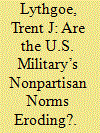

|
|
|
|
|
| Summary/Abstract |
The U.S. military’s nonpartisan norms are an important part of healthy civil–military relations. Some research, however, suggest these norms are weakening. This study examines the evidence for eroding nonpartisan norms by analyzing U.S. military servicemembers’ partisan affiliations and political activism levels from 2008 to 2018. It finds that since 2008, military servicemembers have become more likely to identify as partisans. Servicemembers have also become more politically active than civilians, although this is due to decreasing activism among the American public. It also finds that longer-serving service members have stronger nonpartisan norms, but that newer servicemembers are more politically active than both longer-serving servicemembers and civilians. These findings provide a firmer empirical foundation for previous claims of eroding norms and suggest more research is needed to understand how increased partisanship and political activism impacts military readiness and civil–military relations.
|
|
|
|
|
|
|
|
|
|
|
|
|
|
|
|
| 2 |
ID:
189928
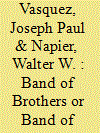

|
|
|
|
|
| Summary/Abstract |
Research suggests that marginalized groups can use military service to win greater governmental and social acceptance by using civic republican rhetoric, however, conditions in which claims-making rhetoric is coercive are underspecified. Because rhetorical effectiveness requires sympathetic ears, we examine the influence of (1) expectations and political efforts of marginalized group members seeking greater acceptance, (2) whether majority group economic status is outpacing marginalized groups seeking improved treatment, and (3) whether marginalized groups have influential military veterans from majority groups as allies. We apply these factors to explain the claims-making failure of German Jews following the First World War and the success of African Americans after the Second World War. From the African American case, we also conclude that military service led to greater socio-political inclusion and rights based on development of future political actors through leadership development processes and inter-group contact, especially regarding Presidents Truman and Eisenhower.
|
|
|
|
|
|
|
|
|
|
|
|
|
|
|
|
| 3 |
ID:
189929


|
|
|
|
|
| Summary/Abstract |
The civil-military relations literature on Turkey focuses predominantly on the guardianship role of the Turkish military, its interventions, and the role of the National Security Council as the main institutional mechanism of military tutelage. Yet, the existing studies lack a much-needed focus on the law enforcement or policing missions of the Turkish military. To fill this gap, this study discusses the EMASYA Protocol (Emniyet Asayiş Yardımlaşma or Security and Public Order Assistance), a secret protocol signed in 1997. Emerging in the context of political instability and military tutelage of the 1990s, the Protocol enabled the military to conduct internal security operations without permission from the civilian authorities. This paper argues that the EMASYA Protocol provided a sphere of “reformulated new professionalism” for the Turkish military, enabled it to specialize in the war against rising internal threats such as reactionary Islam and Kurdish separatism, and created anomalies in civil-military relations in Turkey.
|
|
|
|
|
|
|
|
|
|
|
|
|
|
|
|
| 4 |
ID:
189920
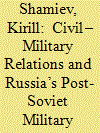

|
|
|
|
|
| Summary/Abstract |
This article studies the role of military culture in defense policymaking. It focuses on Russia’s post-Soviet civil–military relations and military reform attempts. After the fall of the Soviet Union, Russia’s armed forces were in a state of despair. Despite having relative institutional autonomy, the military neither made itself more effective before minister Serdyukov nor tried to overthrow the government. The paper uses the advocacy coalition framework’s belief system approach to analyze data from military memoirs, parliamentary speeches, and 15 interviews. The research shows that the military’s support for institutional autonomy, combined with its elites’ self-serving bias, critically contributed to what I term an “imperfect equilibrium” in Russian civil–military relations: the military could not reform itself and fought back against radical, though necessary, changes imposed by civilian leadership.
|
|
|
|
|
|
|
|
|
|
|
|
|
|
|
|
| 5 |
ID:
189932
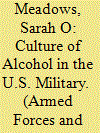

|
|
|
|
|
| Summary/Abstract |
Excessive alcohol use, especially binge and heavy drinking, represents a serious threat to force readiness across the Department of Defense. Though these behaviors are a matter of individual service member choice, they are influenced by perceptions of the culture of alcohol use in the military. This paper uses data from the 2018 Health Related Behaviors Survey of Active Duty service members to explore associations between perceived alcohol culture and excessive alcohol use, any serious drinking consequences, risky driving behaviors, productivity loss due to drinking, absenteeism, and presenteeism. Results from multivariate logistic regression reveal a strong, positive correlation between positive perceptions of drinking culture in the military and all outcomes. Targeting perceptions of the drinking culture is one way the military can reduce excessive and unhealthy use of alcohol and negative sequelae.
|
|
|
|
|
|
|
|
|
|
|
|
|
|
|
|
| 6 |
ID:
189924


|
|
|
|
|
| Summary/Abstract |
Militaries are commonly deployed in response to domestic disasters. However, our understanding of this phenomenon remains incomplete, partly because the particulars of disasters make it hard to generalize about deployments used in response. This article leverages the COVID-19 pandemic’s global reach to systematically evaluate common hypotheses about when and how militaries are used to respond to domestic disasters. It presents original global data about domestic military deployments in pandemic response and uses it to assess common theoretical expectations about what shapes whether and how militaries are used in such contexts. The results suggest that decisions about whether to deploy militaries stem from the securitization of domestic disaster relief rather than being responses to specific disaster-related features, state capacity shortcomings, or other social or political factors, even as some of these elements shaped how militaries were used. The article concludes by outlining some hypotheses for future research about the impact of this securitization on civil–military relations.
|
|
|
|
|
|
|
|
|
|
|
|
|
|
|
|
| 7 |
ID:
189919
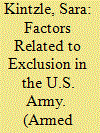

|
|
|
|
|
| Summary/Abstract |
The promotion of inclusion in the U.S. Army requires an understanding of how and why exclusion occurs. As exclusion can have deleterious impacts at both and individual and organizational level, reducing exclusive behaviors can have positive effects on Soldiers and the Army. To explore exclusion in the Army, 19 focus groups were conducted with 120 active-duty enlisted Soldiers. Two rounds of thematic analysis revealed four themes related to exclusion. Participants indicated exclusion to be often based on low or bad performance, personality factors that were identified as different or toxic, cliques within the Army unwilling to welcome others, and gender, with both men and women identifying exclusionary behaviors toward women within and outside of the work environment. Research findings offer insight into how and why exclusion occurs and how such behaviors can be addressed in the U.S. Army including training and addressing cultural and systemic barriers to inclusion.
|
|
|
|
|
|
|
|
|
|
|
|
|
|
|
|
| 8 |
ID:
189927


|
|
|
|
|
| Summary/Abstract |
Evidence suggests that UK veterans are seen as victims with concern for their perceived mental health needs. This study examined sociodemographic factors that contribute to victimizing conceptualizations of British Army Iraq and Afghanistan veterans. UK participants (N = 234) provided three word associations to “British Army Iraq Veteran” and “British Army Afghanistan Veteran” and answered sociodemographic questions. A multiple linear regression outlines that low national pride, mission opposition and higher levels of education predict elevated victimizing word associations. Narrative accounts from UK interviews (N = 21) suggest that participants who perceived the recent conflicts as illegitimate conceptualize veterans as passive, naïve actors who had to submit to the agency of the anthropomorphic described government. This allowed holding overtly appreciative though belittling attitudes toward veterans, while opposing the missions. To dissociate veterans from victimizing perceptions, better knowledge about service and justifications for deployments need to be provided. Study limitations, including over sampling of young adult females, are discussed.
|
|
|
|
|
|
|
|
|
|
|
|
|
|
|
|
| 9 |
ID:
189930


|
|
|
|
|
| Summary/Abstract |
The peacetime deployment of U.S. forces in foreign countries goes against traditional notions of sovereignty. How did such deployment become legitimate following World War II? This article examines the legal strategy that the U.S. military employed to make American troop presence more palatable to foreign publics and to critics at home: granting certain legal authority over offending troops to host countries, while seeking to shield troops from trials in host-country courts. The military also used local, informal ties with hosts to guarantee fair legal treatment for troops and worked to convince skeptics that U.S. troops faced no legal threat. The mitigating of legal tensions helped the military create conducive political conditions for its presence abroad and likely contributed to the durability of U.S. deployments. The Cold-War practice contrasts sharply with the contemporary desire of the United States to maintain complete jurisdiction over its troops.
|
|
|
|
|
|
|
|
|
|
|
|
|
|
|
|
| 10 |
ID:
189926
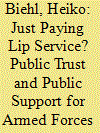

|
|
|
|
|
| Summary/Abstract |
The article presents an empirical analysis of whether, how, and why people are active to either support or protest against the Bundeswehr. Public opinion polls consistently report high levels of trust in the military. According to the social-psychological approach of participation theory, this trust should lead to corresponding actions. However, the literature on civil–military gaps claims that the majority of people pay mere lip service to soldiers rather than actively support the armed forces. No active support despite high levels of trust? In an effort to empirically test the level and the determinants of the public’s support for and protest against the military, an activity scale was included in a representative opinion poll in Germany. The analyses show that a fairly large part of the German population engages in activities that support the Bundeswehr and that public trust in the military predicts that supportive behavior. Importantly, trust in the armed forces remains a strong predictor of citizens’ activities related to the armed forces even when controlling for numerous other factors. Taken together, these findings contradict the widely shared view of a civil–military gap and instead provide empirical evidence for the social-psychological approach of participation theory.
|
|
|
|
|
|
|
|
|
|
|
|
|
|
|
|
| 11 |
ID:
189925
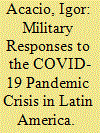

|
|
|
|
|
| Summary/Abstract |
The military in Latin America has been extensively involved in pandemic relief operations. This paper analyses the impact of militarization of pandemic relief operations on human rights. It argues that not all militarization is equally harmful to individuals in the region. When troops assume responsibilities regarding medical care and logistical support, human rights violations do not follow. When involved in policing the stay-at-home orders, the extent of human rights violations is explained by the level of operational autonomy the military has in public security operations. The more autonomous the military, more likely abuses are to occur. Additionally, military exposure to judicial prosecution for human rights offenses contributes to the explanation. After gathering original empirical evidence from 14 Latin American democracies on military presence in pandemic relief, we draw our inferences from process tracing on four comparative case studies of Argentina, Brazil, Chile, and El Salvador.
|
|
|
|
|
|
|
|
|
|
|
|
|
|
|
|
| 12 |
ID:
189921


|
|
|
|
|
| Summary/Abstract |
This study interrogates the experiences of Nigerian troops in the war against Boko Haram. The paper’s contribution is bi-dimensional. First, it adds to the empirical literature on Boko Haram by analyzing the perspectives of rank-and-file troops. The study finds 10 forms of corruption affecting troops. These have contributed to the inability to defeat Boko Haram. Second, the paper adds to theoretical scholarship on civil–military relations and persistence of small wars. It challenges the bureaucratic-organizational model and the focus of civil–military relations theory on civilian control of the military. The study emphasizes the need to focus on the texture of the relationship between civilian and military leaders. The paper argues that the bureaucratic-organizational model has limited relevance to militaries in the postcolony and proposes a civilian–military leadership interest convergence thesis. The findings are relevant for understanding the spread of terrorism in sub-Saharan Africa and the persistence of small wars in non-Western, illiberal quasi-democratic societies.
|
|
|
|
|
|
|
|
|
|
|
|
|
|
|
|
| 13 |
ID:
189923
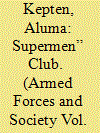

|
|
|
|
|
| Summary/Abstract |
How does secrecy shape narratives of militarized hegemonic masculinity? This article assesses a gap at the intersection between theories of masculinities and organizational secrecy. Supported by 15 interviews with current and former male workers of a covert section of an Israeli national security organization, it argues that secrecy is experienced as both an external hurdle and a central component to the way that men internalize masculinity. Unable to access social capital outside the security organization, the respondents of the study construct a social field inside it through which they can assert their masculinity. They do so by conceptualizing their jobs, themselves, and the organization through a prism of sacrificial warriorhood, and actively incorporate secrecy’s constraints into a narrative of “super-men”. This study thus examines secrecy in the context of a militarized environment, showing the experience of masculinity and a perceived lack of power-access among members of a dominant group.
|
|
|
|
|
|
|
|
|
|
|
|
|
|
|
|
| 14 |
ID:
189931


|
|
|
|
|
| Summary/Abstract |
Through the analysis of 24 in-depth, semi-structured interviews, this study explored the process through which disability affects veterans’ experiences in the university classroom and their social relations with traditional students. Using inductive-exploratory qualitative methods, this study builds upon the sociological understanding of veterans’ experiences in higher education. Findings from this study tentatively suggest that while disability related fear/hypervigilance, stigma, and anxiety significantly impact veterans’ comfort levels when engaging with traditional students, veterans also externalize the impact of their disability as a social artifact of their military service. More research is needed to determine if the interaction of disability and artifacts of service decreases veterans’ ability to integrate well with traditional students in classroom settings.
|
|
|
|
|
|
|
|
|
|
|
|
|
|
|
|
|
|
|
|
|